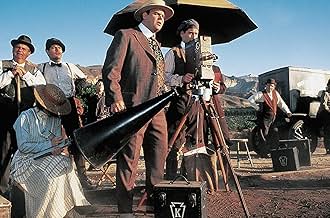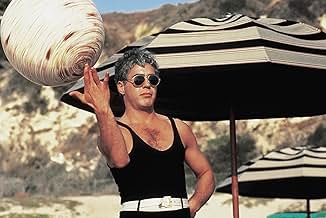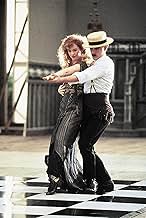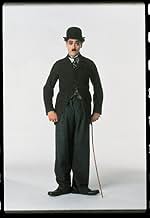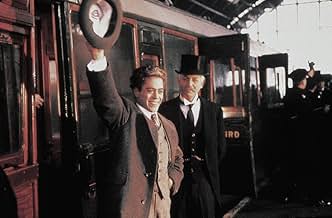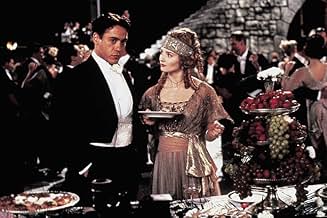IMDb-BEWERTUNG
7,5/10
64.576
IHRE BEWERTUNG
Ein Film über das schwierige und umstrittene Leben des Meisterkomödianten Charlie Chaplin.Ein Film über das schwierige und umstrittene Leben des Meisterkomödianten Charlie Chaplin.Ein Film über das schwierige und umstrittene Leben des Meisterkomödianten Charlie Chaplin.
- Für 3 Oscars nominiert
- 3 Gewinne & 20 Nominierungen insgesamt
Deborah Moore
- Lita Grey
- (as Deborah Maria Moore)
Empfohlene Bewertungen
An attempt to make a film that is both honest and at the same time shamelessly self-serving about its (auto)biographical subject -- the legendary comedian/director Chaplin -- is pulled off with style. It's fun to see some modern talents inhabit the roles of screen's bygone icons (though in some cases a little less charicature would have been appreciated, especially in the case of Mabel Normand). Kline, surprisingly enough, makes a convincing Fairbanks. The rest of the cast is also well-picked -- X-Files fans should watch closely to catch quite a few glimpses of lower-billed David Duchovny as Chaplin's personal editor.
The direction is very good; I particularly liked how some of the straight scenes were filmed in a comic, surrealist style (Chaplin's escape from the police w/ his cans of "the Kid" reels is staged like a Keystone Komedy), while some of what might have been more comic elements are played straight (Chaplin's attempt to convince his brother that "The Tramp" cannot talk in a movie is both funny and serious, for example). Some of the (perhaps true to life) melodramatic elements are a bit overplayed (the bit with his mom was handled too heavily for my tastes, especially her shouting his name as she's dragged away by the asylum guards), but generally the film avoids genre cliches and "easy" scenes.
Great photography.
Downey Jr. fits the roll well, even rising to many of the physical challenges of the Chaplin mystique.
A superior film of its type, laced with self-conscious humor and self-reflection on the artistic temperament.
The direction is very good; I particularly liked how some of the straight scenes were filmed in a comic, surrealist style (Chaplin's escape from the police w/ his cans of "the Kid" reels is staged like a Keystone Komedy), while some of what might have been more comic elements are played straight (Chaplin's attempt to convince his brother that "The Tramp" cannot talk in a movie is both funny and serious, for example). Some of the (perhaps true to life) melodramatic elements are a bit overplayed (the bit with his mom was handled too heavily for my tastes, especially her shouting his name as she's dragged away by the asylum guards), but generally the film avoids genre cliches and "easy" scenes.
Great photography.
Downey Jr. fits the roll well, even rising to many of the physical challenges of the Chaplin mystique.
A superior film of its type, laced with self-conscious humor and self-reflection on the artistic temperament.
This film is beautiful and intelligent, if a little ambitious and overlong (2 and a quarter hours). But it is so worth seeing, for the superb Oscar-nominated performance from Robert Downey Junior. The film starts off flawlessly, with beautiful incidental music from John Barry, and a fantastic performance from Geraldine Chaplin, who played her own grandmother.
We also see Fred Karno, robustly played by John Thaw, and Hetty , played by Moira Kelly(who did struggle with the accent). A standout from the supporting cast, was a lively performance from Kevin Kline, who brought some great energy into the role of Douglas Fairbanks. The performances in general are very good indeed, and the film looks ravishing with show stopping costumes and scenery.
However, it is after the death of Fairbanks, that the film starts to drag, and the title characters rapidly turn into a series of vignettes. As much a great actor Anthony Hopkins is, his turn as the fictional autobiographer was perhaps unnecessary. And I was a bit confused why they turned Hoover as a villain who wanted Chaplin out of the country. The ending is poignant, and Moira Kelly does better in her role as Oona.
The end credits were very educational, and the arrangement of Smile was one of my highlights of this beautifully made but ambitious film. Worth watching for those who are a fan of Richard Attenborough (the director) 8/10 Bethany cox
We also see Fred Karno, robustly played by John Thaw, and Hetty , played by Moira Kelly(who did struggle with the accent). A standout from the supporting cast, was a lively performance from Kevin Kline, who brought some great energy into the role of Douglas Fairbanks. The performances in general are very good indeed, and the film looks ravishing with show stopping costumes and scenery.
However, it is after the death of Fairbanks, that the film starts to drag, and the title characters rapidly turn into a series of vignettes. As much a great actor Anthony Hopkins is, his turn as the fictional autobiographer was perhaps unnecessary. And I was a bit confused why they turned Hoover as a villain who wanted Chaplin out of the country. The ending is poignant, and Moira Kelly does better in her role as Oona.
The end credits were very educational, and the arrangement of Smile was one of my highlights of this beautifully made but ambitious film. Worth watching for those who are a fan of Richard Attenborough (the director) 8/10 Bethany cox
Robert Downey Jr., first of all, portrays Chaplin with amazing accuracy. Some parts of this performance are particularly memorable, such as his invention of the famous tramp's walk just after having feverishly picked out the outfit, the astonishingly accurate depiction of Charlie as an old man, and of course, the many parts of the film that involve parts of his life where he was working on his own films. These are clearly some of the most interesting parts of the movie, if only because these films are how we know him, but it is at least as interesting the way that the film hints towards things that happened in Chaplin's life that inspired those films.
Very early in the film, we see a scene in which Charlie's mother is booed off the stage by an impatient crowd, so Charlie, who is a little boy at the time, gets on stage to do a song and dance of his own. He performs a song that is very similar to the one his mother performed, but he wins the audience's heart and they respond by tossing coins onto the stage for him. You can't help noticing how this corresponds with the constantly youthful look of the Tramp (in Modern Times, for example, Chaplin was in his late 40s but looked like a teenager), and the coins tossed on stage may have played a significant role in helping him realize that this could be a good way to make money.
Charlie moves to America to pursue his dream, and we see the landmark events that punctuated his dizzying rise to stardom. He goes to work briefly on stage and is then hired by Mack Sennett, a gigantic figure in film history, but is unsatisfied because of his own lack of control over his work. It should also be noted here that there is a scene where he is working with director Mabel Normand, who demands acting from him that he does not agree with, and with whom he clashes. In 1914, Chaplin starred in a 9 ½ minute film called Mabel's Busy Day, in which he plays the uncharacteristic role of the antagonist. The Mabel in this film is a sporting event vendor who turns down Charlie's amorous advances, after which Charlie proceeds to steal all of her products and hand them out to anyone standing nearby. Then in 1920, he starred in another short comedy called Mabel's Strange Predicament, in which Mabel is a woman who becomes locked out of her hotel room in her pajamas and ends up avoiding the drunken Charlie for the rest of the film. In both films, Charlie plays uncharacteristic roles, the most unenviable of which was in Mabel's Busy Day, which Mabel Norman directed.
Later in the film we see Charlie in a small diner just after having terminated his employment with Mack Sennett, and he meets Edna Purviance in a scene that is reminiscent of his romantic endeavors in such early films as Caught In A Cabaret and, even more so, The Immigrant, one of his most famous early films. There are dozens of other references to the development of his cinematic personality - such as his sudden realization of how to make the Tramp appear rich to the blind girl in City Lights without talking, as well as the dance of the dinner rolls, which Charlie performs here at a dinner at an expensive restaurant - but there is an even more significant portrayal of Charlie's beliefs and his values in this movie that are more recognizable as well as more memorable to people not familiar with his earlier and less known work.
Charlie Chaplin was one of many filmmakers' in the earlier times of the medium that resented and disapproved of the coming of sound to the movies. His Tramp remains one of the most recognized figures in the history of the cinema, and it is widely known that the Tramp is an almost entirely silent character, so it is necessary for a film about Chaplin's life to address this in some way, and it is done perfectly here. There is a scene where Charlie's brother is trying to convince him to add spoken dialogue into his films and Charlie refuses outright, giving a hilarious example of a Russian ballet dancer and saying, `The Tramp CAN'T talk. The minute he talks, he's dead.' This is a brilliant way to illustrate Charlie's fondness for the silent film, as well as his knowledge that no voice given to the Tramp would fit his character right. He was too well known to be changed so profoundly.
Charlie Chaplin created 81 movies in his lifetime, many of them timeless and truly memorable, and has made a significant impact on the filmmaking medium as well as on the world itself. He was a fascinating personality both onscreen and off, which is another element of his life that was necessarily and skillfully presented in this film, this time directly in the dialogue in what is probably the single most important line in the entire film `If you want to understand me, watch my movies.' Chaplin's ever-present sympathy for the underprivileged is subtly but effectively portrayed as two poor people approach him on his way out of a nice restaurant, right at the beginning of the Great Depression, asking for his autograph. The elderly Charlie notes in retrospect that, `I wish they'd wanted my money.'
He is always aware throughout the film and throughout his life of the difficulties constantly facing poor people, and he wants to give these people not only an escape with his films, but hope for the future. There is a point in the film where Charlie has returned to Europe to see an old friend, and he learns on the train that she has died. He is then asked, `What'll we do, Charlie?' And his answer, although spoken under his breath almost in a whisper, rings louder than anything else in the film.
`Smile.'
Very early in the film, we see a scene in which Charlie's mother is booed off the stage by an impatient crowd, so Charlie, who is a little boy at the time, gets on stage to do a song and dance of his own. He performs a song that is very similar to the one his mother performed, but he wins the audience's heart and they respond by tossing coins onto the stage for him. You can't help noticing how this corresponds with the constantly youthful look of the Tramp (in Modern Times, for example, Chaplin was in his late 40s but looked like a teenager), and the coins tossed on stage may have played a significant role in helping him realize that this could be a good way to make money.
Charlie moves to America to pursue his dream, and we see the landmark events that punctuated his dizzying rise to stardom. He goes to work briefly on stage and is then hired by Mack Sennett, a gigantic figure in film history, but is unsatisfied because of his own lack of control over his work. It should also be noted here that there is a scene where he is working with director Mabel Normand, who demands acting from him that he does not agree with, and with whom he clashes. In 1914, Chaplin starred in a 9 ½ minute film called Mabel's Busy Day, in which he plays the uncharacteristic role of the antagonist. The Mabel in this film is a sporting event vendor who turns down Charlie's amorous advances, after which Charlie proceeds to steal all of her products and hand them out to anyone standing nearby. Then in 1920, he starred in another short comedy called Mabel's Strange Predicament, in which Mabel is a woman who becomes locked out of her hotel room in her pajamas and ends up avoiding the drunken Charlie for the rest of the film. In both films, Charlie plays uncharacteristic roles, the most unenviable of which was in Mabel's Busy Day, which Mabel Norman directed.
Later in the film we see Charlie in a small diner just after having terminated his employment with Mack Sennett, and he meets Edna Purviance in a scene that is reminiscent of his romantic endeavors in such early films as Caught In A Cabaret and, even more so, The Immigrant, one of his most famous early films. There are dozens of other references to the development of his cinematic personality - such as his sudden realization of how to make the Tramp appear rich to the blind girl in City Lights without talking, as well as the dance of the dinner rolls, which Charlie performs here at a dinner at an expensive restaurant - but there is an even more significant portrayal of Charlie's beliefs and his values in this movie that are more recognizable as well as more memorable to people not familiar with his earlier and less known work.
Charlie Chaplin was one of many filmmakers' in the earlier times of the medium that resented and disapproved of the coming of sound to the movies. His Tramp remains one of the most recognized figures in the history of the cinema, and it is widely known that the Tramp is an almost entirely silent character, so it is necessary for a film about Chaplin's life to address this in some way, and it is done perfectly here. There is a scene where Charlie's brother is trying to convince him to add spoken dialogue into his films and Charlie refuses outright, giving a hilarious example of a Russian ballet dancer and saying, `The Tramp CAN'T talk. The minute he talks, he's dead.' This is a brilliant way to illustrate Charlie's fondness for the silent film, as well as his knowledge that no voice given to the Tramp would fit his character right. He was too well known to be changed so profoundly.
Charlie Chaplin created 81 movies in his lifetime, many of them timeless and truly memorable, and has made a significant impact on the filmmaking medium as well as on the world itself. He was a fascinating personality both onscreen and off, which is another element of his life that was necessarily and skillfully presented in this film, this time directly in the dialogue in what is probably the single most important line in the entire film `If you want to understand me, watch my movies.' Chaplin's ever-present sympathy for the underprivileged is subtly but effectively portrayed as two poor people approach him on his way out of a nice restaurant, right at the beginning of the Great Depression, asking for his autograph. The elderly Charlie notes in retrospect that, `I wish they'd wanted my money.'
He is always aware throughout the film and throughout his life of the difficulties constantly facing poor people, and he wants to give these people not only an escape with his films, but hope for the future. There is a point in the film where Charlie has returned to Europe to see an old friend, and he learns on the train that she has died. He is then asked, `What'll we do, Charlie?' And his answer, although spoken under his breath almost in a whisper, rings louder than anything else in the film.
`Smile.'
Robert Downey, Jr. gives another one of his splendid performances, Kevin Kline is perfectly cast as Fairbanks, and most of the direction is superb. However, the story hops around a few too many times, and the scenes with Anthony Hopkins are weak and obviously placed in order to clarify things to non- Chaplin fans who watch the film. Overall it is enjoyable, especially the parts when we see him creating his well- known masterpieces. Recommended especially for movie fans, and most especially for Chaplin fans.
Chaplin isn't really a great bio-pic, but there are moments when Richard Attenborough's direction shines and it's consistently got an amazing Robert Downey Jr. performance as the title character. In fact, this is the kind of movie where the lead actor is so important that some of the major enjoyment and success of the film rests on him/her, oddly enough since it is a varied and superlative ensemble. There are moments when Attenborough's grandiosity gets in the way, and the moments that mark it as being somewhat conventional. What made me pleasantly surprised is what Attenborough *did* decide to show with Chaplin the private man; I thought that he would cut out much of the stuff with Chaplin's penchant for young (usually underage) girls, or some of the things regarding his mother, but most of the notorious facts are put in for good measure to counter-balance some of the pompous, though fascinating, scenes of "cinematic history."
Now as a fan of Chaplin's films and the given acknowledgment that he's one of the most talented comic actors and filmmakers of the 20th century, I do get a little choked up seeing that final clip-show at the Oscars of great clips from his most famous movies. And it's interesting always, from just a movie-buff stand-point, to watch the history behind Chaplin's transition from vaudeville to Max Senett's film company to slowly becoming an independent and world-famous auteur/star. But for the most part the writing and the direction make it entertaining just on that conventional, rise-fall-rise-fall-struggle-success-at-end story with maybe less drugs and a bit more politics than one might usually see (save for one fantastic scene when Chaplin and his brother and friends are sneaking around the film footage of The Kid from the brass who want it for tax purposes).
What makes it almost outstanding, however, is Downey Jr. He's funny as Chaplin when he needs to show how he was a great clown (i.e. the 'old-drunk' bit), he's melancholy when needed, he plays Chaplin as young, middle-aged, and old perfectly, and there's just the slightest details that keep you glued to the screen to see what he'll do next. It's not exactly a breakthrough role as he'd been doing some really good work intermittently in the late 80s, but this is the one that got him recognition by the likes of the Academy, and rightfully so. It's masterful work in a decent tribute to Sir Charles "Tramp" Chaplin, and should delight those looking for a good ensemble and a commanding lead performance.
Now as a fan of Chaplin's films and the given acknowledgment that he's one of the most talented comic actors and filmmakers of the 20th century, I do get a little choked up seeing that final clip-show at the Oscars of great clips from his most famous movies. And it's interesting always, from just a movie-buff stand-point, to watch the history behind Chaplin's transition from vaudeville to Max Senett's film company to slowly becoming an independent and world-famous auteur/star. But for the most part the writing and the direction make it entertaining just on that conventional, rise-fall-rise-fall-struggle-success-at-end story with maybe less drugs and a bit more politics than one might usually see (save for one fantastic scene when Chaplin and his brother and friends are sneaking around the film footage of The Kid from the brass who want it for tax purposes).
What makes it almost outstanding, however, is Downey Jr. He's funny as Chaplin when he needs to show how he was a great clown (i.e. the 'old-drunk' bit), he's melancholy when needed, he plays Chaplin as young, middle-aged, and old perfectly, and there's just the slightest details that keep you glued to the screen to see what he'll do next. It's not exactly a breakthrough role as he'd been doing some really good work intermittently in the late 80s, but this is the one that got him recognition by the likes of the Academy, and rightfully so. It's masterful work in a decent tribute to Sir Charles "Tramp" Chaplin, and should delight those looking for a good ensemble and a commanding lead performance.
Wusstest du schon
- WissenswertesGeraldine Chaplin played her real-life paternal grandmother Hannah Chaplin.
- PatzerWhen Charlie is shown at the 1972 Oscars near the end of the movie, he is showed being brought to the podium in the wheelchair and then standing at the podium as the movie clips played. In the actual awards ceremony, Charlie walked out to the podium under his own power after the clips ended.
- Zitate
German Diplomat: [offering his hand] Mr. Chaplin! I am a great admirer of yours.
Charlie Chaplin: I'm sorry, I prefer not to shake hands with Nazis.
German Diplomat: [laughs nervously] What have you got against us, Mr. Chaplin, hm?
Charlie Chaplin: What have you got against everybody else?
- Crazy CreditsThe film ends with the final scene of Der Zirkus (1928): Charlie Chaplin walks off into the distance.
- Alternative VersionenTo receive a 12 certificate the original UK cinema version was cut to remove one use of 'fucking' (during Charlie's homecoming visit to a pub). Later releases were uncut and upgraded to a 15 rating.
- VerbindungenFeatured in Friday Night: Folge #1.11 (1992)
- SoundtracksThe Honeysuckle and The Bee
Written by Albert Fitz and William H. Penn (as William Penn)
Top-Auswahl
Melde dich zum Bewerten an und greife auf die Watchlist für personalisierte Empfehlungen zu.
- How long is Chaplin?Powered by Alexa
Details
- Erscheinungsdatum
- Herkunftsländer
- Offizielle Standorte
- Sprachen
- Auch bekannt als
- Chaplin
- Drehorte
- Produktionsfirmen
- Weitere beteiligte Unternehmen bei IMDbPro anzeigen
Box Office
- Budget
- 31.000.000 $ (geschätzt)
- Bruttoertrag in den USA und Kanada
- 9.493.259 $
- Eröffnungswochenende in den USA und in Kanada
- 84.669 $
- 27. Dez. 1992
- Weltweiter Bruttoertrag
- 9.493.259 $
- Laufzeit
- 2 Std. 23 Min.(143 min)
- Farbe
- Seitenverhältnis
- 1.85 : 1
Zu dieser Seite beitragen
Bearbeitung vorschlagen oder fehlenden Inhalt hinzufügen



